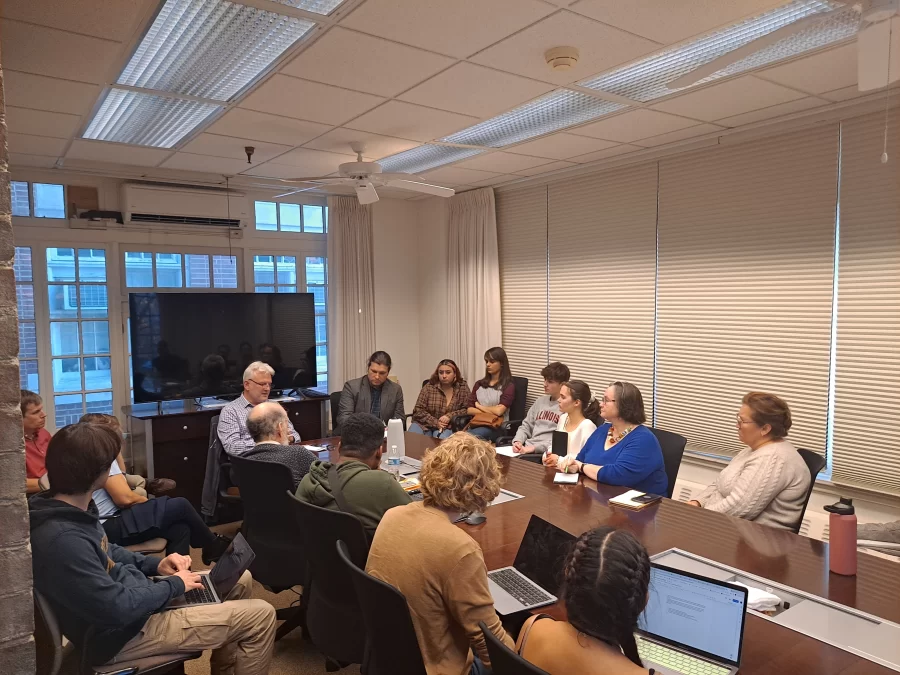Ukrainian political analyst holds discussion on Russia-Ukraine War
Photo courtesy of Lucia Sanchez
Ukrainian political analyst Volodymyr Dubovyk speaks about the Russo-Ukrainian relations and current war on Wednesday.
November 11, 2022
“They strike the bridge; we fix the bridge.”
This was the sentiment reflected by guest speaker Volodymyr Dubovyk this past Wednesday in a discussion over Russo-Ukrainian relations and their current war.
Dubovyk, an associate professor at Mechnikov National University in Odesa, Ukraine, has given lectures at prominent universities in America, such as Harvard and Tufts, regarding international relations and Eastern Europe. Dubovyk spoke at the University’s European Union Center within the Illinois Global Institute, where he discussed politics, economics, social ties and history, all within the context of the conflict.
Hailing from Odesa, Ukraine, Dubovyk retains a personal connection to the conflict in Ukraine and provides an insider perspective.
Since 2006, he has been an executive committee member of the Project on New Approaches for Russian Security-Eurasia and is considered by many to be an expert on Ukrainian international relations.
Get The Daily Illini in your inbox!
Sofia Ponomarev, freshman in LAS, attended the lecture and said she learned from a new perspective.
“I learned how the war really affected the effectiveness of the Ukrainian government and Ukrainian institutions,” Ponomarev said.
Ponomarev also expressed interest in additional conversations about geopolitical issues. With the vast network of scholars and professors the University has, she believes there could be more discussion over geopolitical conflicts.
“It’d be a good idea to educate those who are interested in geopolitics on these issues,” Ponomarev said. “Instead of just taking courses.”
Dubovyk highlighted the attitude of Ukrainians toward Russians. He said that Ukrainians are proud of their democratic systems, having fought for them since 2014 in the Russian annexation of Crimea, and that practically speaking, Ukraine and Russia have been at war ever since.
Dubovyk also noted that Ukrainians remain hopeful for the future. Many still aspire for Ukraine to become an EU member state. Others believe the national unity the war brought could lead their country to prosperity in the coming years.
Although Russia stands at triple the population of Ukraine and possesses far greater military might, Ukraine has managed to defend itself. Military powers across the world have funded the Ukrainian defense effort, causing this war to become a global issue.
Dubovyk said he was shocked by the response, especially from European nations. Many parts of Europe quickly cut their oil dependence on Russia, bank accounts of Russian oligarchs were closed, and the ruble fell sharply in value for a short time.
As the United States has funded Ukraine’s efforts and supplied weapons, some students believe it is increasingly important for other students to continue to be informed regarding Ukraine.
Mia Macias, junior in LAS, noted that some students might only have a surface-level understanding of the conflict filtered through social media.
“Not many students know the issue other than seeing it in the news or on social media,” Macias said. “That’s important, especially for students who might be in majors like chemistry, where you’re not necessarily learning it on a daily basis.”
Macias emphasized that the conflict in Ukraine touches on important human rights issues, and also questioned why certain geopolitical conflicts aren’t discussed more in the media.
“Overall, it involves a bunch of human rights issues which you should care about,” Macias said. “Issues like the Palestine and Israel conflict, at least in my opinion, would be talked about more if they were a European country. Leaders say, ‘Oh, this shouldn’t have happened’, but you shouldn’t only acknowledge that it’s important, you need to do something.”







